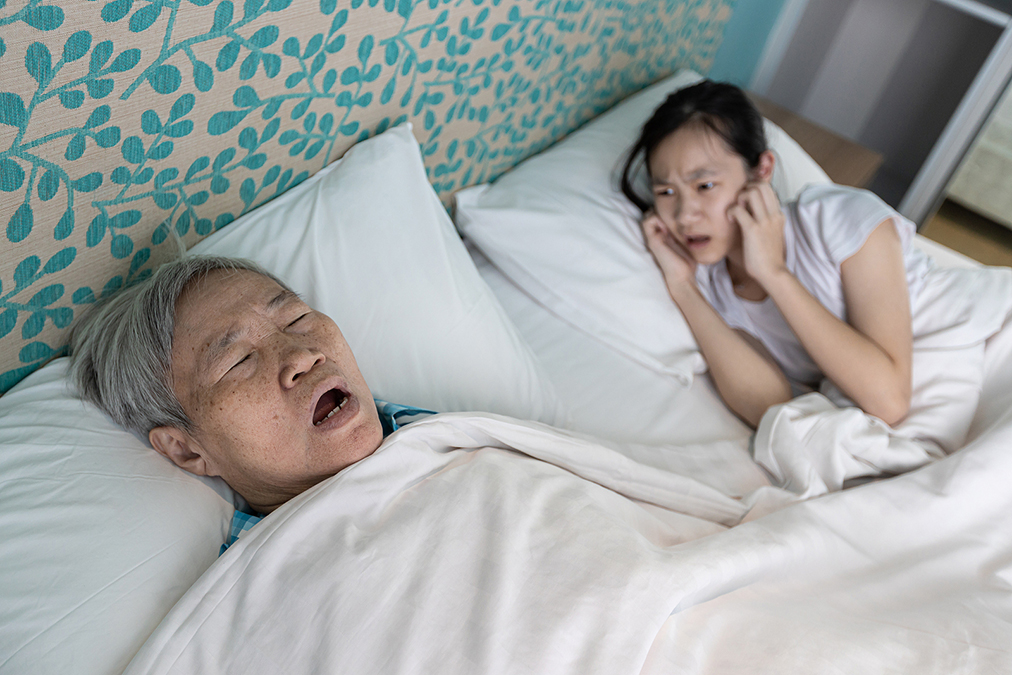 Two studies have been released in the past month that demonstrate the destructive effects of snoring and sleep apnea on your cognitive abilities.
Two studies have been released in the past month that demonstrate the destructive effects of snoring and sleep apnea on your cognitive abilities.
One explains how snoring interferes with children’s cognatic development.
The other proves that adults who snore or have sleep apnea are almost guaranteed to develop some type of dementia.
In the first study, published in the journal Sleep Medicine Reviews, researchers from the University of Sydney and University of New South Wales investigated whether sleep apnea could delay or prevent the full neurocognitive development of children.
After searching through medical databases and identifying the strongest published studies on this question, they included 63 studies that were all of moderate or high quality.
The most shocking finding was that the neurocognitive outcomes were equally bad for children with sleep apnea and children who only snored.
-
1. The worst effects were on the children’s overall intelligence and linguistic development, which were far behind those of similarly aged children.
2. Other cognitive domains were also negatively affected, including memory, decision-making, attention, and visual spatial abilities.
3. The effects were especially severe for children of a younger age and for those with a higher body mass index, the latter of which suggests that you might have a bit of control over how far behind their peers your children will be.
As if this is not alarming enough, the second study in the Journal of Sleep Research links sleep apnea with dementia.
Scientists from l’Université de Montréal in Canada also performed an analysis on already published studies that investigated the relationship between sleep apnea and various disorders related to dementia.
These included Alzheimer’s disease, Parkinson’s disease, Lewy body dementia (the second most common type of dementia after Alzheimer’s), vascular dementia (caused by reduced blood flow to the brain), and frontotemporal dementia (caused by the shrinkage of the front of the brain).
They found 11 good-quality studies with 1,333,424 participants and reached some worrying conclusions.
-
1. Sleep apnea patients had a 43 percent increased risk of any cognitive disorder.
2. They were 28 percent more likely to have Alzheimer’s disease and 54 percent more likely to have Parkinson’s disease.
3. They were twice as likely to develop Lewy body dementia, although there was only one study that investigated this association specifically.
Both these studies demonstrate just how destructive sleep apnea can be on brain development and the maintenance of good intellectual health, regardless of our age.
And if you have begun to experience those forgetful ‘senior moments’, then learn to boost your brain with energy by loading up on this one, free ingredient explained here…

 Overcoming IBD
Overcoming IBD Multiple Sclerosis
Multiple Sclerosis Banishing Bronchitis
Banishing Bronchitis Gum Disease Gone
Gum Disease Gone Overcoming Onychomycosis
Overcoming Onychomycosis Neuropathy No More
Neuropathy No More The Prostate Protocol
The Prostate Protocol Brain Booster
Brain Booster
 Ironbound
Ironbound
 Solution for Shingles
Solution for Shingles
 The Bone Density Solution
The Bone Density Solution
 The Ultimate Healing Protocol
The Ultimate Healing Protocol
 The Parkinson's Protocol
The Parkinson's Protocol
 The Chronic Kidney Disease Solution
The Chronic Kidney Disease Solution
 Overthrowing Anxiety
Overthrowing Anxiety The Fatty Liver Solution
The Fatty Liver Solution The Hypothyroidism Solution
The Hypothyroidism Solution
 The End of Gout
The End of Gout The Blood Pressure Program
The Blood Pressure Program
 The Oxigized Cholesterol Strategy
The Oxigized Cholesterol Strategy
 Stop Snoring And Sleep Apnea Program
Stop Snoring And Sleep Apnea Program
 The Arthritis Strategy
The Arthritis Strategy The Vertigo & Dizziness Program
The Vertigo & Dizziness Program The 3-Step Diabetes Strategy
The 3-Step Diabetes Strategy Hemorrhoids Healing Protocol
Hemorrhoids Healing Protocol The Erectile Dysfunction Master
The Erectile Dysfunction Master Weight Loss Breeze
Weight Loss Breeze The IBS Program
The IBS Program The Insomnia Program
The Insomnia Program The Migraine and Headache Program
The Migraine and Headache Program The Neck Pain Solution
The Neck Pain Solution The Menopause Solution
The Menopause Solution The Ejaculation Master
The Ejaculation Master The TMJ Solution
The TMJ Solution The Acid Reflux Solution
The Acid Reflux Solution The Fibromyalgia Solution
The Fibromyalgia Solution The Psoriasis Strategy
The Psoriasis Strategy